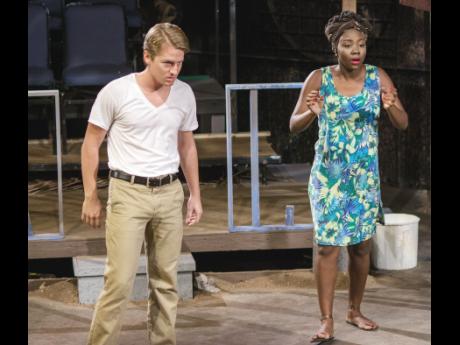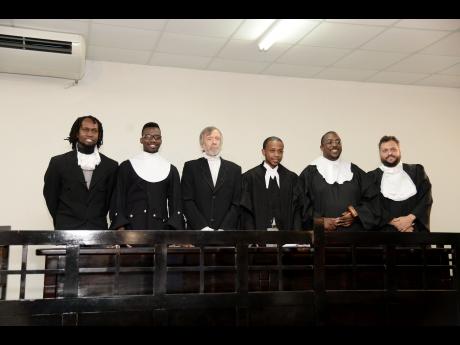For the Reckord | J'can theatre seen through Trainer's eyes - US scholar/actor finds not what he expected
Jamaican theatre turned out to be very different from what Tom Trainer expected. The Fulbright scholar and actor, who came here last October from Villanova University, Pennsylvania, had to rethink his topic after starting his research.
Wanting to incorporate his love of drama into the political science he is pursuing, he came to Jamaica intending to study "political satire and socio-political critique in commercial comic theatre". He'd thought Jamaican theatre would feature the equivalent of Saturday Night Live, for example.
"But after I did a series of interviews (with many major theatre practitioners), it became apparent that the topic was not robust enough in Jamaica to be studied," he said. Practically all his interviewees spoke about a "golden age" of theatre in Jamaica and lamented its passing. So Trainer decided to study what had changed, and why, with regard to the critiquing of socio-political issues in Jamaican theatre since 1962.
Guided by his supervisor in Jamaica, actress and CARIMAC lecturer Fae Ellington, he chose the 1962 starting date because with Independence, Jamaicans felt politically empowered.
"They felt this was their country, they were going to tell their story and take their culture back from the Europeans," Trainer said.
Feeling of empowerment
His research indicated that the performing arts reflected the feeling of empowerment, which was evident in the Little Theatre Movement's (LTM) Pantomime.
"The pigment of the actors changed (from white to black) over the years after 1941 when it began," he said. There was a flood of Jamaican plays being written and produced. Previously, adaptations of European plays were the norm.
Trainer said the contemporary theatre scene is "vastly different" from what it was in the so-called "golden age." His interviewees were distressed that serious theatre was currently only being done by small groups like Tribe Sankofa, Quilt and the now disbanded Sistren, in small theatres like the Philip Sherlock Centre for the Creative Arts and facilities the Edna Manley College for the Visual and Performing Arts.
Trainer is getting material for his thesis from mainly traditional sources - interviews, library literature, scripts of past productions, and the plays he has been seeing since October. He also got to act in three productions - Bert Samuels' The Trial of Governor Eyre, Errol John's Moon on a Rainbow Shawl and Michael Holgate's Garvey, the Musical - which enabled him to meet members of the theatre community.
Serendipitously, the plays' themes relate to Trainer's thesis. "All are very political," he said. "They comment on race, class and Jamaican/Caribbean identity. They have messages that are relevant today."
Despite that, Trainer said the productions attracted quite small audiences, which dismayed him, though his interviewees had warned him that local audiences prefer comedies over serious drama.
"In Jamaica, it's almost a case of no comedy, no audience," he said ruefully.
Acknowledging that to a degree, this is a worldwide phenomenon, he pointed out that the USA's large audiences and sophisticated theatre infrastructure means producers of serious plays can "stick their necks out" further than Jamaican producers felt they dare to. He was happy to hear of plans to take Garvey, the Musical to Barbados for CARIFESTA XIII in August.
However, he stressed, "I was impressed by the quality of the work done in comedic commercial theatre, given the scarce resources available; and I do understand the inherent value of sheer entertainment for people."





